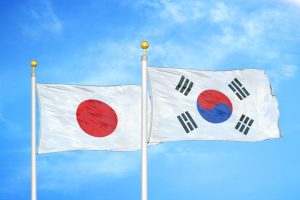Japan’s relations with South Korea – its geographically closest neighbor and a fellow U.S. ally – have always been complicated, with almost cyclical ups and downs. The ebb and flow of the relationship is intimately related to historical grievances that have existed between the two countries since their diplomatic normalization.
Under the current Moon administration, however, the relationship has fallen to a new low. The South Korean police chief’s visit to the Liancourt Rocks – called Takeshima by Japan, which claims the islands, and known as Dokdo in Korean – while Washington was hosting the South Korean and Japanese vice foreign ministers for a trilateral consultation was the latest example of the fraught relationship. The Japanese vice foreign minister subsequently refused to hold a joint press conference in protest. The episode was a reminder that there is little hope left for improvement in Japan-South Korea relations before Moon leaves office in May 2022.
In the past, when Japan-South Korea relations hit a deadlock, many in Japan looked at South Korea’s presidential elections as an opportunity to “reset” the relationship under a new South Korean president. This has been particularly the case because many South Korean presidents, as their poll number slides toward the end of their presidency, have tapped into anti-Japanese sentiment in the country to boost their popularity. The most dramatic example was former President Lee Myung-bak who, despite a strong desire he demonstrated earlier in his tenure to move Japan-South Korea relations beyond their historical grievances, decided to visit the Liancourt Rocks in a desperate effort to prop up his poll numbers toward the end of his presidency. He was the first South Korean president to travel to the disputed islands.
In recent history, the only exception to this trend has been the now-disgraced Park Geun-hye. In the later years of her presidency, Park institutionalized the Japan-South Korea intelligence-sharing arrangement by signing General Security of Military Information Agreement (GSOMIA) as well as reaching the 2015 Comfort Woman Agreement, in which the two countries agreed to a series of steps to be taken by both governments to reach a “final and irreversible” resolution of the issue. Unfortunately, Park’s political downfall, which saw her impeached in 2017, has also tarnished the decisions she made on Japan policy.
Given the historical trends, one might think the upcoming South Korean presidential election in March 2022 could serve as a chance for a reset of the relationship. However, from what has been said from the presidential candidates so far, Japan has little reason to be hopeful for such an opportunity. For instance, Lee Jae-myung, the presidential nominee of Moon’s liberal Democratic Party of Korea, said that he is opposed to a trilateral U.S.-Japan-Korea alliance, even questioning, “Is Japan a friendly country which is always trustworthy?” Yoon Suk-yeol, the candidate from the conservative People Power Party, also said that he would demand a “sincere apology” from Japan regarding wartime issues. In short, the two candidates seem to be competing over which of them has a more hardline position against Japan.
These statements from the two main presidential candidates are an example of a fundamental shift in the dynamics surrounding Japan-South Korea relations: Japan-related issues have been so politicized in South Korea that it is not possible for the two governments to focus on the issues of today, many of which they have shared concerns about.
There has been change on the side of Japan as well. In the past, whenever there was an anti-Japan action and/or statement from South Korea that was related to history issues, Japan used to rush to reiterate past apologies and looked for opportunities to patch up the relationship. However, Tokyo no longer feels compelled to be the first one to move to repair its relations with Seoul. “Apology fatigue” had already been strong in Japan before Moon took office, and it only got worse during the Moon administration.
This is really unfortunate. Looking forward, Japan and South Korea have more shared concerns and challenges than disagreements. Their common interests include not only traditional security challenges such as North Korea and China, but also supply chain resiliency, climate change, and economic revitalization in post-pandemic era, to name a few. In particular, as strategic competition between the U.S. and China continues, it is more mutually beneficial for Japan and South Korea to get their relationship back on track.
Japan’s new prime minister, Kishida Fumio, can be a good partner for South Korea’s new president, whoever it will be, to reset their relationship. Kishida is a moderate conservative who does not have the “right wing” image that his predecessor Abe suffered from. Furthermore, Kishida, who negotiated and signed the 2015 Comfort Woman Agreement as Abe’s foreign minister, is a proponent of re-constructing Tokyo’s relationship with Seoul. Whether Kishida can find a willing partner in Seoul to reset the relationship, however, is far from clear.































